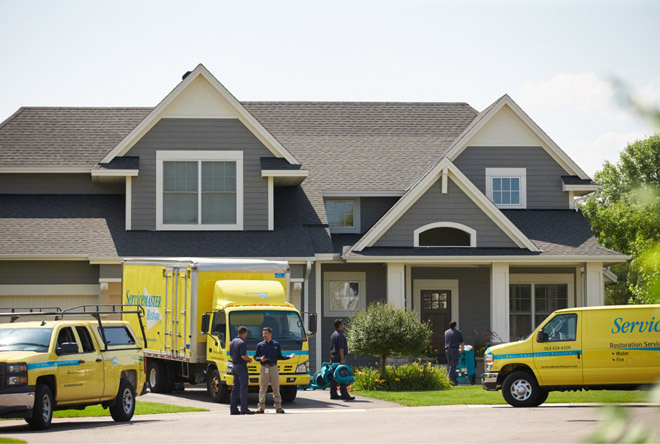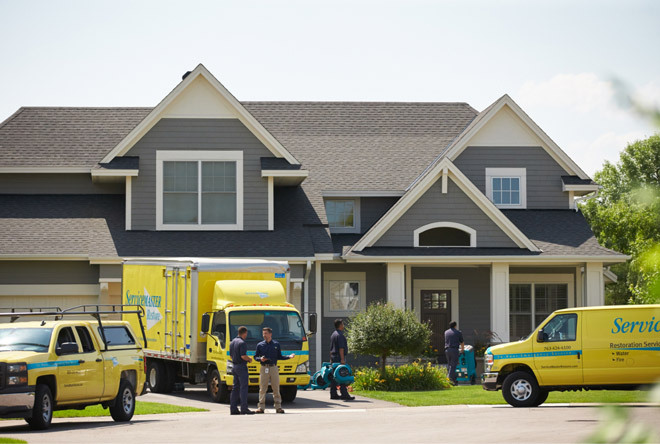Water Damage Cleanup in Atlantic, IA
Helping You Recover from Life’s Unexpected Leaks and Floods
When water invades your home, it doesn’t just disrupt your daily routine; it threatens your property, safety, and peace of mind. At ServiceMaster by Rice, we specialize in water damage cleanup services for Atlantic, IA, homeowners and businesses. Whether it’s a flooded basement after a heavy rain or a burst pipe, acting quickly is essential to limit damage and avoid long-term issues like mold growth or structural damage.
Our team is available 24/7 to help you respond to water damage fast, clean up safely, and restore your home to a livable condition as soon as possible.
Common Causes of Water Damage in Atlantic Homes
Water damage can occur suddenly or build up slowly over time. In Atlantic, common culprits include:
- Flooding from storms or rapid snowmelt
- Roof leaks, especially after wind or hail
- Burst pipes due to freezing winter temperatures
- Leaking water heaters or malfunctioning appliances
- Overflowing sinks, tubs, or toilets
What’s the Difference Between Flood Damage and Other Water Events?
Flood damage typically refers to water that enters the home from outside sources, such as overflowing rivers or heavy rainfall. This type of event is often not covered under standard homeowner’s insurance and may require separate flood coverage.
Other forms of water damage, like a burst pipe or leaking appliance, are generally covered by most policies, especially if they’re sudden and accidental.
No matter the source, water damage cleanup should begin immediately. If you're unsure whether to call a professional, the answer is usually yes. Trained technicians can assess hidden damage, remove water thoroughly, and prevent mold growth.
Our Step-by-Step Water Damage Cleanup Process
At ServiceMaster by Rice, we use a proven method to ensure efficient and complete water damage cleanup:
- Initial Inspection and Damage Assessment: We evaluate the extent of the damage, determine the water source, and classify the type of water (clean, gray, or black).
- Water Removal and Extraction: High-powered pumps and vacuums remove standing water quickly. The faster the water is removed, the less damage it causes.
- Drying and Dehumidification: Industrial-grade dehumidifiers and air movers reduce moisture in walls, floors, and other materials.
- Cleaning and Sanitizing: We disinfect all affected surfaces to eliminate bacteria and odors. In cases involving gray or black water, extra care is taken to ensure full sanitation.
- Restoration and Repairs: Finally, we restore your home to its pre-damage condition, whether that means minor drywall repairs or full flooring replacement.
Throughout the process, we keep you informed and provide documentation for insurance claims.
Why Professional Water Damage Restoration Services Are Critical
Quick DIY solutions may seem appealing, but they can leave behind hidden moisture that leads to serious issues. Here’s why professional water damage cleanup matters:
- Mold Growth Risks: Mold can start growing within 24 to 48 hours after water exposure.
- Structural Damage: Saturated drywall, wood, and insulation can weaken and decay over time.
- Specialized Equipment: Our tools detect moisture behind walls and beneath floors that the naked eye can’t see.
- Trained Technicians: Our team is IICRC-certified and trained to safely handle even complex cleanup scenarios.
Professional services not only ensure thorough drying and cleaning but also help prevent recurring problems.
What to Do Right After a Water Leak or Burst Pipe
- If you’ve discovered a leak or flood in your home:
- Shut off the water source, if possible.
- Turn off electricity in affected areas to prevent shock.
- Move valuables and furniture to a dry area.
- Call a professional water damage restoration team like ServiceMaster by Rice.
- Avoid using electrical appliances or fans until professionals say it’s safe.
Acting fast can save you time, money, and headaches later.
Spotting and Addressing Roof Leaks Before They Worsen
Roof leaks are a common source of water damage, especially during Iowa’s storm seasons. Signs of a roof leak inside your home include:
- Discoloration or water spots on ceilings
- Peeling paint or bubbling drywall
- Damp insulation in the attic
- Mold or mildew smells
Ignoring roof leaks can lead to rot, mold, and costly repairs. Regular inspections and prompt attention to warning signs can prevent a small issue from becoming a major disaster.
Local Flood Damage Restoration Services in Atlantic, IA
Atlantic and other parts of Iowa experience seasonal flooding that can affect both homes and businesses. Low-lying areas and properties near creeks are especially at risk. Flood damage differs from general water damage in both cleanup procedures and insurance coverage.
Floodwaters often contain contaminants like sewage, chemicals, and debris. This requires a more rigorous cleanup process involving specialized sanitization techniques and protective equipment.
Simple Ways to Prevent Water Damage in Your Home
Prevention is always better than restoration. Here are a few steps you can take to reduce your risk of water damage:
- Inspect your roof, gutters, and foundation annually
- Maintain appliances like water heaters, dishwashers, and washing machines
- Insulate pipes to prevent freezing in winter
- Install smart water leak detectors that alert you to issues early
- Ensure proper drainage around your home to keep rainwater away
Routine maintenance and early detection are key to avoiding extensive damage.
Frequently Asked Questions About Water Damage Cleanup
How fast should I respond to water damage?
Immediately. The sooner water is removed, the lower the risk of mold and structural damage.
Is water damage covered by insurance?
Most sudden and accidental events are covered, but flood damage typically requires separate insurance.
What’s the typical cleanup timeline?
Minor cases may take 3 to 5 days. More severe damage involving structural repairs or mold removal can take longer.
Will I need mold remediation?
If water has sat for more than 48 hours or if the area has poor ventilation, mold remediation may be necessary.
What’s the difference between mitigation and restoration?
Mitigation focuses on stopping further damage (like removing water), while restoration repairs the damage (like replacing drywall or flooring).
Don’t let leaks linger — protect your home from lasting damage. Our certified water damage experts in Atlantic are ready 24/7 to restore your peace of mind.
Call Now



